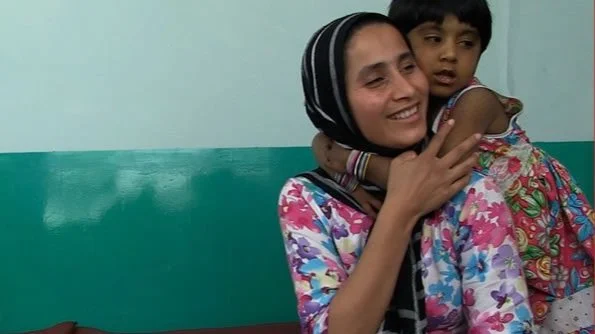A Thousand Girls Like Me
Leave aside the fighting and Afghanistan is still a place where shocking events occur.
What distinguishes this documentary feature from Afghanistan is its horrendous revelation of just how far a patriarchal society can go in denying the human rights of women. Deeply sincere though the film is, it is possible at times to query the approach of its director, Sahra Mani, who also shares the writing credit. In telling the story of 23-year-old Khatera Gulzad and her family, the film is at times shot in a style which in terms of close-ups, camera movement and set-ups is nearer to what we expect in a fictional film than in a documentary and this can raise doubts. Thus, an early scene features dialogue (later on voice-overs carry the main weight) and this makes one wonder about possible enactments for the camera. Furthermore, the last quarter of the film, important as much of this late footage is, seems rather drawn out to meet feature length.
Yet any such reservations are of no real importance. We may have had other films from Middle Eastern countries about the constraints still placed on women in those societies but A Thousand Girls Like Me has a special significance and importance. It starts by referring to legislation in 2009 theoretically penalising abuse against women, but it then illustrates devastatingly the extent to which the victims are treated as moral criminals so that the law is rarely invoked.
That is the background against which Khatera's story plays out. This woman had from childhood been abused by her father only gradually coming to realise that this sexual contact was not, as he claimed, entirely normal and appropriate. We learn, not entirely to our surprise, how complaints by her and her mother to the authorities and to various mullahs were largely brushed aside. Only Khatera's brave decision to tell her story on television produced any results. Even then legal proceedings against her father would be long drawn out with many a challenge being made regarding the truth of Khatera's allegations.
It's a situation which in itself would warrant a film, and all the more so because Khatera is seen struggling to bring up the daughter who is also her sister and in addition looking after a son born after the proceedings started and fathered in the same way. But what is even more shattering is the response by other Afghans to the situation. Now that publicity has made the case public knowledge, Khatera is seen - and not only by her uncle's family - as being the one who has brought disgrace on her family's name. On account of this, her brothers find it hard to get work, relatives threaten her with violence and, given the disapproval of neighbours as well, Khatera, her mother and children have to move again and again. As the title of the film indicates, Khatera's story is far from unique and, if her tale is a damning comment on the attitude of the authorities, it is even more disturbing as a reflection of Afghan society generally.
MANSEL STIMPSON
Featuring Khatera Gulzad, Zainab Gulzad, Mohammed Gulzad, Zahra Gulzad, Mahfouza Foulhad, Ghazi Ruhulla.
Dir Sahra Mani, Pro Nicole Levigne, Khosraw Mani, Sahra Mani, Martine Vidalenc and Emmanuel Quillet, Screenplay Sahra Mani and Giles Gardner with Khosraw Mani and Olivier Trives, Ph Sahra Mani and others, Ed Giles Gardner, Music Elodie du Détroit, Jacobo Velez Masa and Cyril Orcel.
First Hand Films/Afghanistan Doc House/Marmitafilms/Les Films du Tambour de Soie-DocHouse.
80 mins. Afghanistan. 2018. Rel: 5 October 2018. No Cert.


